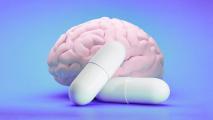
Biotech
Human history has been all but defined by death and disease, plague and pandemic. Advancements in 20th century medicine changed all of that. Now advancements in 21st century medicine promise to go even further. Could we bring about an end to disease? Reverse aging? Give hearing to the deaf and sight to the blind? The answer may be yes. And soon.
More
Lab-grown meat techniques aren’t new
Cell cultures are common tools in science, but bringing them up to scale to meet society’s demand for meat will require further development.
Immune cells in the brain may reduce damage during seizures and promote recovery
Microglia perform many functions in the brain, and their role in seizures is unclear — a new study in mice aims to find out more.
Scientists monitored the brains of 4 dying patients. Here’s what they found
Researchers found a surge of neurophysiological activity in the dying human brain, including in regions associated with conscious processing.
These giant viruses are unlike any we’ve ever seen before
Scientists have discovered a variety of “giant viruses” unlike any ever seen before in Massachusetts’ Harvard Forest
Brain-computer interfaces could let soldiers control weapons with their thoughts
Brain-computer interfaces raise many ethical questions about how and whether they should be used for certain applications — including war.
Why death matters
Reframing life in terms of death reveals some of the biggest philosophical problems with how we think about living systems.
New study shows how electricity can turn on genes
A prototype wearable demonstrates a novel way to trigger gene expression: by zapping cells with electricity.
What lies beneath our irrational decisions
In new book, an MIT scholar examines how game-theory logic underpins many of our seemingly odd and irrational decisions.
AI will soon tell doctors how to predict your future health
A new AI can can analyze X-rays for a important predictor of heart disease with a high degree of accuracy.
Two CRISPR treatments for Alzheimer’s ace early studies
Two teams of researchers have used CRISPR to alter the genes of mice to alleviate signs of Alzheimer’s disease.
Almost everyone fears death — but not in the same ways
Fear of death may be the most primal, normal human fear, but it’s one we all experience differently.
First-of-their-kind eye drops reverse blindness in teen
A topical gene therapy designed to heal the wounds of people with “butterfly skin disease” has now been used to reverse blindness.
New clinical trial is testing a ketamine skin cream for PTSD
A topical ketamine treatment designed to alleviate the symptoms of PTSD without causing hallucinations has entered clinical trials.
4 ways to promote neurogenesis in your brain
Research from the 1960s proves creating new neurons as adults is possible, and modern-day research explains how to promote it.
New RSV shot protects babies against dangerous lung infections
The FDA has approved nirsevimab, an RSV shot that protects babies against the leading cause of infant hospitalizations in the US.
ADHD drugs could alleviate symptoms of Alzheimer’s
Scientists reviewed 40 years of clinical studies that assessed the effects of NA-targeting drugs, such as certain ADHD drugs, on Alzheimer’s.
Neuroscience research triggers revision of a leading theory of consciousness
A brain scanning study on unconsciously processed visual information disrupts a leading theory of consciousness: global workspace theory.
Radioactive drugs are transforming cancer treatment
Radiopharmaceuticals allow doctors to directly target patients’ cancer cells and avoid healthy tissue typically damaged by radiation therapy.
Got COVID but felt fine? It may be your genes.
A person’s chances of having asymptomatic COVID are dramatically increased if they possess a certain genetic mutation.
Startup aims to transplant pig hearts into kids in 2024
eGenesis hopes to transplant pig hearts from genetically engineered swine into young children with serious heart defects by 2024.
Subscribe to the newsletter































